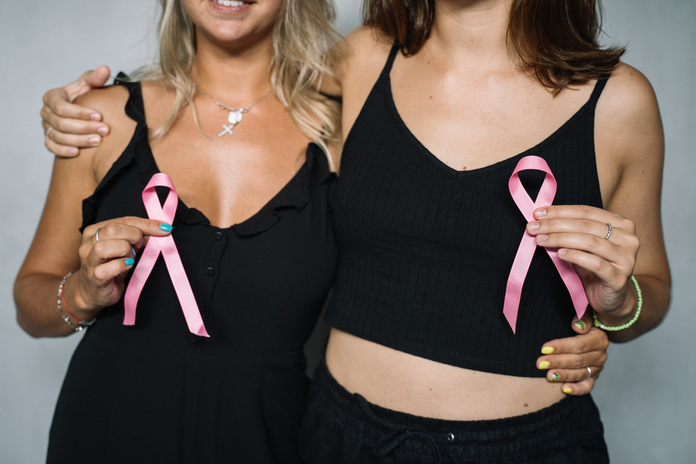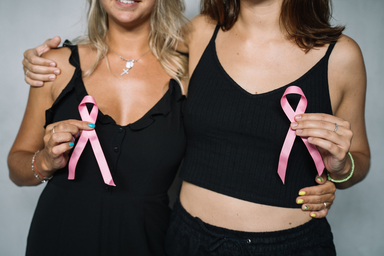‘Touch your breasts, can you feel anything new or unusual? Look for changes, does anything look different? Check any changes with your GP.’
‘Check all parts of your breasts, your armpits and up to your collar bone for any changes. No matter what size or shape your breasts are, check them regularly.’
In honour of breast cancer awareness month, my friends and I have naturally started to openly talk about our personal stories and experiences with the impact that breast cancer has had on our lives. As a result, we got together to talk and raise awareness about breast cancer, this article is a message to normalise and open the floor to discussion around checking your boobs.
The nuanced experiences of my friends are proof that this conversion isn’t linear for anyone, we all have our own stories, and I hope that this article is proof that even amongst my friends no two stories are the same. Breast cancer is scary but if found early on it doesn’t have to be. When breast cancer is detected early and is in the localised stage (there is no sign that the cancer has spread outside of the breast), the 5-year relative survival rate is 100%.
My experience with breast cancer has been hard. My grandma unfortunately passed away after battling breast cancer for two years, and though I never got the opportunity to meet her, the impact that this has had on my life has been so prominent. Understanding the grief and loss that my mum must have endured from such a young age, is hard because knowing that she grew up without her mum has translated into a fear that, perhaps, my mum could be taken away from me at such a young age. This is something I rarely talk about, as I know that this is a conversation that I haven’t even begun to process myself.
The discussion of cancer is scary, but by opening the floor to discussion, the weight of the problem is, somewhat, relieved. Through discussing this with my uni friends, I have not only been exposed to their stories, but they have become a part of my source of inspiration for the strength that they show on a day-to-day basis. I hope that by briefly sharing their stories with you, this will encourage you to openly discuss this topic with your friends and family.
Breast cancer for one of my friends was one of her first real interactions with grief and loss, her auntie sadly passed away with breast cancer, and even then, this wasn’t something that she considered in her day-to-day life.
Like many other people’s experiences, her boobs have been sexualised from a very young age, so the internalised stigma of talking about them translated into being uncomfortable with checking her boobs. Growing up she undoubtedly struggled, as her dad never openly spoke about losing his sister, demonstrating to her that grief isn’t meant to be a process that is spoken about. However, it wasn’t until she came to university that she realised that speaking up is one of the ways to get through the painful difficulties of understanding the impact that breast cancer has and helping the process of grief.
Unfortunately for one of my friends, her mum was diagnosed with breast cancer at the beginning of this year, and whilst now she is fortunately in remission, breast cancer is something that she now thinks about every day. For her, it is strange to think that before her mum, it wasn’t even a passing thought, she just (like many) knew stories of people dying, and never expected to be directly affected. Through caring and listening to her mum, and experiencing her treatment alongside her, she found that it is much less scary process than you get told about. She stresses the importance of checking your boobs and finding it early on before it gets too serious, as it is not until you are directly affected that you need to realise how much you need to look after yourself. ‘Do not take life for granted; life can be taken from you at any age.’
On the other hand, for one of my friends she has never had a conversation with her mum or sister, and (fortunately) has not been directly affected by anyone having breast cancer. This has resultantly caused her to disassociate from the idea that something could directly happen to her; acting as though it is unrelated to her, when unfortunately, being a woman, it does hold a significance prominence in our lives.
Heartbreakingly, for another one of my friends, her step-mum is currently battling breast cancer for the second time over the past couple of years, and understandably, this is now a topic that she is hyper aware off and is always at the forefront of her mind to be checking.
She found it difficult to even find the words to describe the impact that this has had on her life, the journey of experiencing first-hand what it is like to go through breast cancer has been hard and uncertain, and whilst originally this was a sensitive topic within her household, it is now a lot easier.
Finally, for another one of my friends the topic of cancer is painful for her to even talk about, her dad unfortunately has had cancer three times in her lifetime, and she truly believed that he wasn’t going to survive. The conversations surrounding breast cancer, and cancer, in general for her is extremely difficult having witnessed someone go through the brutal rounds of treatment. It is understandable that, breast cancer therefore hasn’t been at the forefront of her mind, due to feeling uncomfortable with even talking about her personal struggles with her dad having cancer.
All our stories are different, and truthfully, writing this article was a difficult and heart-breaking experience to be detailing both mine and my friends’ experiences with breast cancer, but this shouldn’t be a topic that we are afraid to talk about. It wasn’t until this month’s social media awareness campaign that many of us began to start checking our boobs for any abnormalities – including myself and my friends.
The discussions surrounding breast cancer shouldn’t wait until something personal happens to us, nor until we start checking. Talk to your friends, talk to your family as everyone has a story, and it is okay to not be okay. 1 in 2 people get cancer so we need break down our internal barriers and talk more openly about this topic. Checking your breasts is so important, it may save your life.


